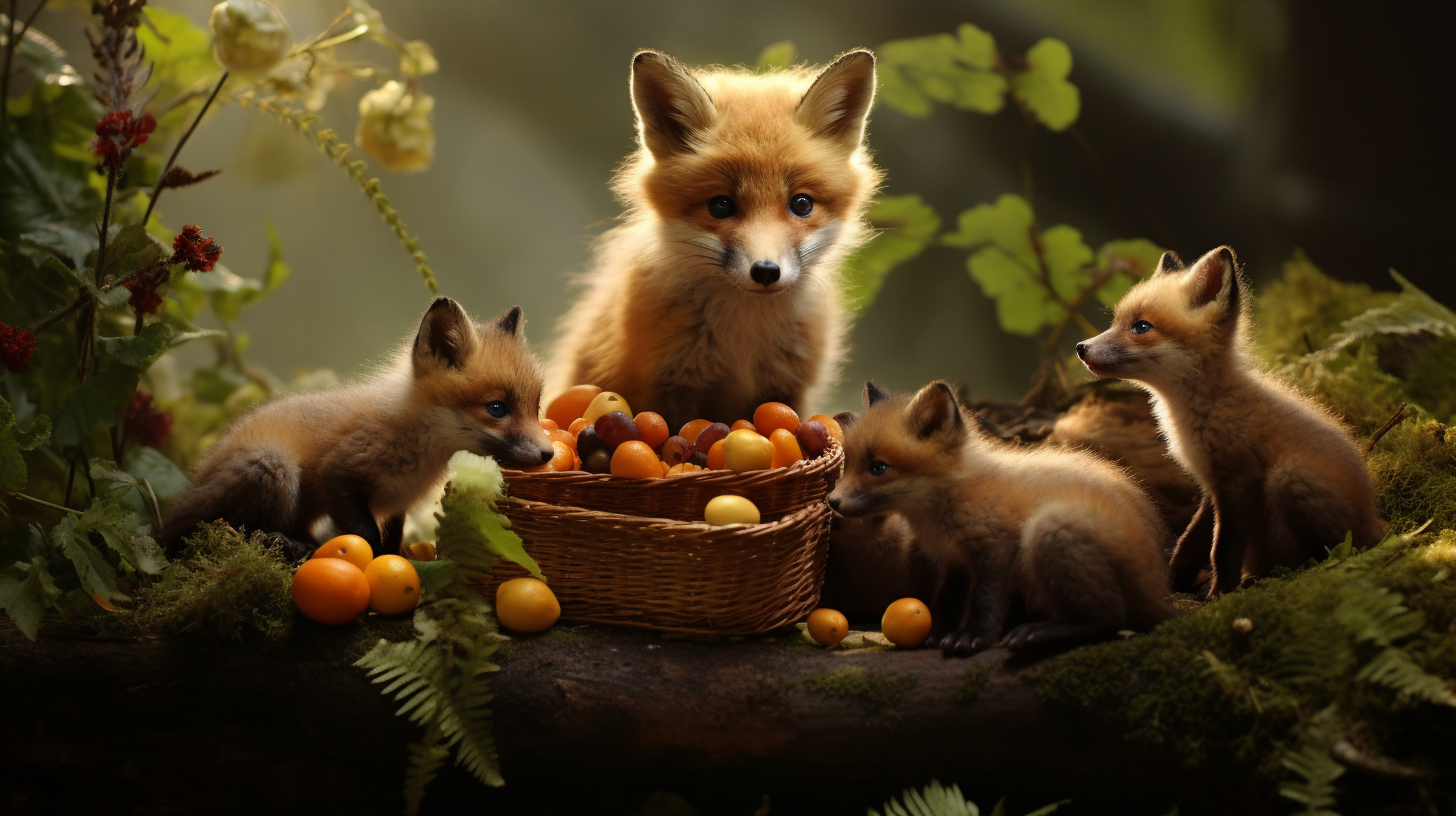If you’ve ever stumbled upon a family of baby foxes, you may have wondered what they eat. These adorable creatures, also known as kits or cubs, have specific dietary needs to help them grow into healthy adult foxes. In this article, we’ll explore what baby foxes eat, how they obtain their food, and other interesting facts about their dietary habits.
Transitioning to Solid Food
As baby foxes mature, they gradually transition from solely consuming milk to incorporating solid food into their diets. This usually occurs when they are around 3-4 weeks old. Their mother gradually introduces regurgitated food to the kits. This regurgitated food consists of small pieces of prey that the mother has caught and partially digested. It helps the kits become accustomed to the taste and texture of solid food.
What Types of Food Do Baby Foxes Eat?
Once baby foxes are around 6-8 weeks old, they are fully weaned and start to eat solid food on their own. At this stage, their diet consists mainly of small mammals such as mice, voles, rabbits, and even birds. They are opportunistic predators and will take advantage of any available food source in their environment.
In addition to small mammals and birds, baby foxes may also consume insects, fruits, berries, and even carrion. They have a diverse diet that allows them to adapt to a variety of habitats and survive in different ecosystems.
Hunting and Foraging Behavior
As baby foxes grow, they develop their hunting and foraging skills under the guidance of their mother. The mother fox plays a crucial role in teaching her kits how to hunt, catch, and kill prey. She demonstrates these skills through play and by providing live prey for the kits to practice their hunting techniques.
Baby foxes mimic their mother’s behavior and gradually learn to hunt on their own. They acquire the necessary skills to stalk, pounce, and capture prey. These skills are vital for their survival as they transition into adulthood.
Interesting Facts about Baby Foxes’ Diet
Now that we’ve covered the basics of what baby foxes eat, let’s explore some interesting facts about their dietary habits:
- Foxes are omnivorous animals. While they primarily consume meat, they also have a fondness for fruits and berries. This omnivorous nature allows them to adapt to various food sources in their environment.
- Foxes are known for their caching behavior. They have a unique way of storing excess food by burying it in the ground. This helps them create a reserve of food for times when prey is scarce.
- Baby foxes have specific nutritional requirements. To support their rapid growth, baby foxes need a diet that is high in calories, protein, and fat. Their mother’s milk provides the necessary nutrients to meet these requirements.
- Foxes are efficient predators. They have excellent hearing and can pinpoint the exact location of small prey, such as mice, under the ground or beneath the snow. This keen sense of hearing helps them be successful hunters.
Protecting Baby Foxes and Their Habitat
It’s important to remember that foxes play a crucial role in balancing ecosystems. They help control populations of small mammals and contribute to the overall health of their habitats. To ensure their well-being, it’s essential to protect their natural habitats, avoid unnecessary interactions, and refrain from feeding them.
Feeding foxes can disrupt their natural foraging behavior and lead to dependency on human-provided food. It can also attract other undesired wildlife to residential areas.
If you ever encounter a family of baby foxes, it’s best to admire them from a distance and allow them to thrive in their natural environment.
Key Takeaways
- Baby foxes, or kits, primarily feed on their mother’s milk. As they grow older, they transition to consuming solid food.
- Baby foxes eat a variety of food, including small mammals, birds, insects, fruits, berries, and carrion.
- The mother fox plays a crucial role in teaching her kits how to hunt and forage for food.
- Foxes have specific nutritional requirements to support their rapid growth.
- Feeding foxes can disrupt their natural foraging behavior and lead to dependency on human-provided food.
FAQ
Q: Do baby foxes eat vegetables?
A: Baby foxes are primarily carnivorous and their diet consists mainly of meat. While they may consume fruits and berries, they do not usually eat vegetables.
Q: Do baby foxes drink water?
A: Yes, baby foxes, like all animals, need water to survive. They obtain water from natural sources, such as rivers and streams, or from the moisture content in the food they consume.
Q: How often do baby foxes eat?
A: Baby foxes typically feed multiple times a day, especially when they are still nursing. As they grow older and start consuming solid food, they may eat less frequently but still require regular meals to meet their energy needs.
Q: Can baby foxes eat pet food?
A: While baby foxes have a varied diet, it is not recommended to feed them pet food. They have specific nutritional requirements that pet food may not meet, and it can disrupt their natural foraging behavior.
Q: Are baby foxes dangerous?
A: Baby foxes are generally not dangerous to humans. They are cautious and shy creatures that prefer to avoid human contact. It is important to respect their space and observe them from a distance to ensure their safety and well-being.
Baby foxes have a diverse diet that consists of milk when they are young and then transitions to solid food as they grow older. Their diet mainly includes small mammals, birds, insects, fruits, berries, and carrion. The mother fox plays a vital role in teaching the kits how to hunt and forage for food. By understanding their dietary habits and protecting their natural habitats, we can ensure the well-being of these fascinating creatures.
Hey there, fellow nature enthusiasts! I’m Mark Gray, the passionate owner of OutdoorAnimals.com, a hub dedicated to uncovering the incredible world of outdoor animals. Whether you’re a hiker, a four-wheeler, or just someone who revels in the beauty of the great outdoors, you’re in the right place. I seek to understand all varieties of animals, from the great elk to the simple mouse, my goal is to write and share this knowledge with the public.

